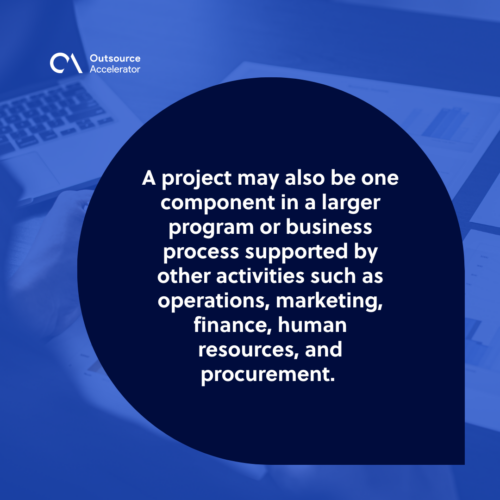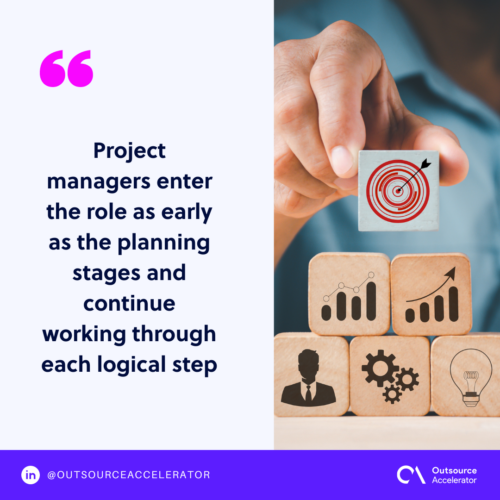Project vs. Product: A comparison

The terms “project” and “product” are frequently used interchangeably, with many in the business world unaware of their differences.
But knowing the difference between projects and products is crucial. It helps you understand where you are in your business, how to prioritize your work, and what you need to do to grow.
Knowing the difference also lets you see what other kinds of work you may need to do to make your project or product successful. Efforts like marketing campaigns, sales pitches, user testing sessions, and focus groups depend on whether you handle a project or a product.
This article explores Project vs. Product, highlighting the differences in purpose, mindset, and management.
Project vs. Product: Definition of terms
First, let’s define the two terms:
What is a project?
A project refers to a temporary venture. It is about creating a unique product, service, or result. It includes defined beginnings and ends, objectives, and scopes.
A project may also be one component in a larger program or business process supported by other activities such as operations, marketing, finance, human resources, and procurement.
Projects exist in all industries, including government and not-for-profit organizations, as well as commercial businesses. Sometimes teams are tasked with managing several projects simultaneously.
Projects can be internal or external to an organization. They are used to completing necessary work but are usually not a part of the regular workflow or ongoing business operations.
Examples of projects include:
- New product development
- Reorganizing an existing service
- Developing a new software application
- Creating a new website

What is a product?
A product is anything that can be offered to a market for acquisition, use, or consumption to satisfy a want or need. Products are usually goods or services. Basically, it’s anything that can be sold to consumers.
Products are marketed through multiple channels, including via sales representatives, advertising, or public relations campaigns. Within businesses, products are categorized based on features, benefits, design, and performance.
The main purpose of a product is to fulfill a need or desire of the user, often over an extended period of time.
Project mindset vs. Product mindset
There are two different ways to approach plans, and the difference between projects and products means you’ll need to adopt either a project mindset or a product mindset.
What is a project mindset?
A project mindset is a state of mind that focuses on getting things done by adopting a short-term view and having the flexibility to change.
The project mindset is driven by the expected outcome of a specific task, so it’s all about getting things done.
A project mindset comprises these main principles:
- Focus on outcomes instead of individual activities
- Source the right tools for the job
- Provide a margin of error for failure
- Learn from mistakes
- Respect your team’s time
What is a product mindset?
The product mindset specifically approached product design. It makes use of product intelligence, which considers developing features that will provide the most value for your customers.
Despite the name, the attitude one should take with a product mindset should be centered on the customer first. Empathy and solving customer needs should be at the core of your planning.
A product mindset considers the following key principles:
- Focus on the user’s experience first
- Ensure that your product won’t be difficult for the customer to use and explore
- Make it easy for consumers to find your product
- Avoid erecting barriers that prevent users from sharing their experiences with others (such as on social media)
- Create a path for progression to entice customers to return
Project vs. product: In terms of management
Within the industry, it’s common for project and product managers to be interchanged (not helped by the fact they’re usually referred to as PM).
In reality, they have different roles and responsibilities.
What is a project manager?
Project managers are instructed to get tasks done. They enter the role as early as the planning stages and continue working through each logical step. Project managers are also frequently tasked with defining the steps that a project entails.
There are multiple project management types that a project manager can supervise. Companies often hire them for specific, one-off occasions but can keep them on depending on the industry.
Common responsibilities of a project manager include:
- Planning – project managers must conduct background studies on the project’s subject, set deadlines, develop budgets and timetables, and pinpoint potential risks.
- Coordinating – they facilitate communication between various stakeholders involved in the project to ensure everyone understands what’s expected of them within each stage.
- Supervising – these professionals oversee all aspects of the project, including team members, budget adjustments, deadlines, and other factors that could impact success. They may also provide guidance to team members throughout their work.
- Quality control – a project manager handles quality control metrics, like customer satisfaction scores or error rates, during a project’s duration.

What is a product manager?
A product manager is responsible for all the activities associated with creating and launching a new product or feature.
Product managers must understand what users want and how they will use the product. They work closely with designers and engineers to define requirements and specifications for new features before building.
Essentially, product managers can be considered a combination of a salesperson, a strategist, and a project manager. Some technical knowledge is also frequently required.
Key responsibilities of a product manager include:
- Market research -product managers must have a deep understanding of the market for their products. This also entails any trends or changes that may affect buying habits. They must also be aware of competitors’ offerings and how their products compare.
- Strategic planning – these experts play a central role in strategic planning through all stages of development. They determine how well products fit into future plans and assess new growth opportunities.
- Product development – every aspect of product development is overseen by the project manager from conception to release, from ideation through design, development, and launch.
Both project and product development have their place. Within your business, it’s up to you to understand the difference so you can approach them accordingly.







 Independent
Independent




